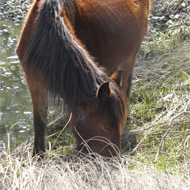New fly grazing legislation progresses

The parliamentary bill has been welcomed by horse and animal welfare organisations, including the RSPCA.
A parliamentary bill to improve laws relating to the fly-grazing of horses has passed its second reading in the House of Commons.
The Control of Horses Bill - a private member's bill proposed by Julian Sturdy, MP for York Outer - would see the time it takes to rescue horses abandoned to fly-grazing reduced from two weeks to four days, with new powers created to allow horses to be sent to animal welfare sanctuaries.
In a debate of the bill on Friday, 24 October, Mr Sturdy said new legislation was important.
"I appreciate that to some the problem of fly-grazing might seem somewhat mundane, but try telling that to the farmer whose crops are being destroyed, to the motorist whose life is endangered by a horse on the road, or to the animal welfare charities who work tirelessly every single day to rescue these horses from the miserable existence to which so many have been condemned. Abandoning horses to a life of neglect has no place in civilised society."
He highlighted the problems caused by irresponsible owners abandoning their horses around the outskirts of York.
"Just last month there was an accident on the A64 from York to Bridlington, involving two horses that were being fly-grazed and a cement lorry. Sadly as one would expect, one horse died almost immediately but the second was only injured and subsequently went missing. It had been moved by persons unknown but was later traced back to a site where the RSPCA attempted to treat the injured mare. Unfortunately, she had to be euthanized soon afterwards, as although she appeared to be responding to treatment, the vets were unable to control her pain and she was found to be bleeding internally. The owner of the horses has yet to come forward."
The bill has been welcomed by horse and animal welfare organisations, including the RSPCA.
RSPCA Head of Public Affairs, David Bowles said: "We are delighted that Julian Sturdy’s Bill passed its second reading stage today with cross party and Government support as we have been fighting for several years for legislation to help tackle the horse crisis. This Bill provides the opportunity to help local authorities and animal welfare organisations to tackle the fly grazing problem... It is due to the tenacity and interest from Julian that we have passed a major obstacle on the road to making all horse owners accountable for their own animals, improving animal welfare and protecting landowners."
Following the bill’s approval at second reading the legislation will now enter its committee stage where the provisions will be widened to include both public and private land to ensure that effective enforcement can take place across the country.



 The Federation of Independent Veterinary Practices (FIVP) has announced a third season of its podcast, Practice Matters.
The Federation of Independent Veterinary Practices (FIVP) has announced a third season of its podcast, Practice Matters.